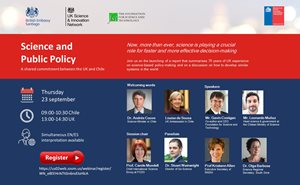EVENTS
The Foundation organises events on key topics in science, research, technology or innovation, bringing together parliamentarians, civil servants, industrialists, researchers, learned societies, charities and others. Those events focus in particular on areas where there are policy decisions needed, which in turn need to be informed by this wide range of inputs and viewpoints. Summary reports are prepared for all events, and these - along with presentation slides, videos of speakers and audio files - are available online after events.
Science & Public Policy - Developing Systems for Science Advice to Governments and Parliaments

- 2021
- Discussion
- Online
This event discussed how science advice contributes towards faster and more effective policy decision-making, under normal and extraordinary circumstances, such as climate change or the Covid pandemic. The event was a celebration UK’s and Chile’s commitment to collaborate on promoting excellence in science-based policy-making, and during the event, a new report was launched entitled "Science Advice in the UK" was launched. The report summarises more than 70 years of UK experience on science advice to the Government & Parliament and aims to serve as inspiration for other countries seeking to establish similar systems. This event was organised by the UK Science and Innovation Network, the Chilean Ministry of Science, the British Embassy Santiago and the Foundation for Science and Technology.
Read MoreThe future of European Space Policy

- 2021
- Discussion
- Online or in person at the Royal Society
Josef Aschbacher became Director General of the European Space Agency in March 2021. In this hybrid event, Mr Aschbacher set out his vision for the future direction of ESA and European space policy. The other members of the panel explored what that means for European space activities, and how that feeds into the UK’s own developing space strategy.
Read MoreLessons from the Vaccine Programme for UK Life Sciences

- 2021
- Discussion
- Online
Covid-19 has been the greatest challenge to governments around the world for a generation. The UK has been at the centre of developing one of the leading global vaccines against Covid, and the UK’s vaccine programme has been a key element of helping the UK come out of Covid restrictions. In this webinar, we explored how the Government has worked with the life sciences industry and academic community during the Covid-19 pandemic, what lessons have been learnt, and what the implications are for future policy, R&D, investment, and collaboration going forward.
Read MoreDeveloping a Systems Approach to reaching Net Zero

- 2021
- Discussion
- Online
If the UK is to reach its target of achieving Net Zero greenhouse gas emissions by 2050, it will require simultaneous transformation of several vital, interconnected infrastructure systems, the development of whole new industries and supporting sweeping societal, cultural, behavioural and structural change. This event explored the task ahead – what such a systems approach looks like, and how the different actors need to come together to deliver it.
Read MoreBiodiversity: Economics, Science and International Action

- 2021
- Discussion
- Online
This webinar explored the economics and science of biodiversity, considering national and international action needed and the potential for agreement at the Biodiversity COP in October 2021.
Read MoreThe future of clinical trials regulation in a post-Brexit UK

- 2021
- Discussion
- Online
On 30th April 2021, representatives from government, parliament, the scientific community, patient groups and industry met for a roundtable discussion on the future of clinical trials and their regulation in a post-Brexit UK. In particular, they discussed the opportunity to make best use of the UK’s capabilities in early-phase clinical research. Following the discussion, the attendees produced a report with their conclusions and recommendations for Government.
Read MoreThe Effect of the Coronavirus Lockdown on the Mental Health of Children and Young People

- 2021
- Discussion
- Online
There is significant concern about the effects of the extended coronavirus lockdown on the mental health of children and young people in the UK. In this webinar, we explored some of the evidence from recent studies, and considered what the policy implications might be in the short and medium term.
Read MoreWill Hydrogen Technologies get us to Net Zero?

- 2021
- Discussion
- Online
In 2019, the UK Government committed to reaching Net Zero emissions by 2050. In the year in which the UK hosts COP26, this webinar explored the extent to which developing hydrogen technologies will be needed to achieve the Net Zero target, what more would be needed to bring these technologies online, and what the economic opportunities of doing so are.
Read MoreCreating a “UK ARPA” – and making it a success

- 2021
- Discussion
- Online
The Government has proposed the creation of a new funding agency, to be “broadly modelled” on the US Advanced Research Projects Agency, which would “provide long term funding to support visionary high-risk, high-pay off scientific, engineering and technology ideas”. This webinar examined how such an agency could work, how it might sit alongside funding structures in the UK, and what it would need to be successful.
Read MoreNuclear Cogeneration and Net Zero

- 2020
- Discussion
- Online
Nuclear cogeneration is where the heat from nuclear power stations can be used not just for electrical generation, but also to address some “difficult to decarbonise” energy demands, such as domestic and industrial heating and the production of hydrogen. It can also be used for the production of medical isotopes. This webinar explored some of the cogeneration opportunities from nuclear power stations, and considered the practical and regulatory issues in delivering them as part of new build nuclear in the UK. How could this contribute to the UK’s overall Net Zero target?
Read More